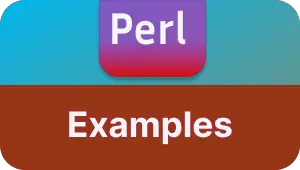Multiple Ways to Remove Whitespace Characters from a String in Perl
This tutorial demonstrates various methods to remove whitespace characters from a given string in Perl.
- using the
String::Utilmoduletrimfunction to remove leading and trailing spaces. Exampletrim(” abc ”) returns abc. - using String pattern matching operator
=~ - use the
Text::Trimmoduletrimfunction
Using the String::Util Module’s trim Function
One approach is to utilize the trim function from the String::Util module to eliminate leading and trailing spaces. For example, trim(" abc ") returns “abc”.
To install the String::Util module, execute the following command in the Windows terminal:
cpan String::Util
Syntax:
trim(string)
Here’s an example to remove leading and trailing whitespace characters from a string
use String::Util 'trim';
my $str = " test ";
my $result = trim($str);
print "$result\n";
Output:
test
This function also removes any whitespace symbols, including newline (\n) or tab (\t) characters.
use String::Util 'trim';
my $str = "\tHello Welcome\n";
my $result = trim($str);
print "$result\n";
Output:
Hello Welcome
Using the Pattern Matching Operator =~ for String Manipulation
Perl provides the pattern matching operator =~ to match a string with a regular expression. We can use it to trim whitespace characters using the pattern s/^\s+|\s+$//g.
Here is an example
my $str = " Hello Welcome ";
$str =~ s/^\s+|\s+$//g;
print "$str\n";
Output:
Hello Welcome
Removing All Whitespaces with Regular Expression
Alternatively, you can utilize the Text::Trim module, which provides the trim function. This function returns a string by removing all leading and trailing whitespace.
Here is an example program
use Text::Trim;
print trim(" hello ");
Output:
hello
Conclusion
This tutorial highlights multiple methods to eliminate whitespace characters from a string in Perl, providing flexibility and versatility in string manipulation.
